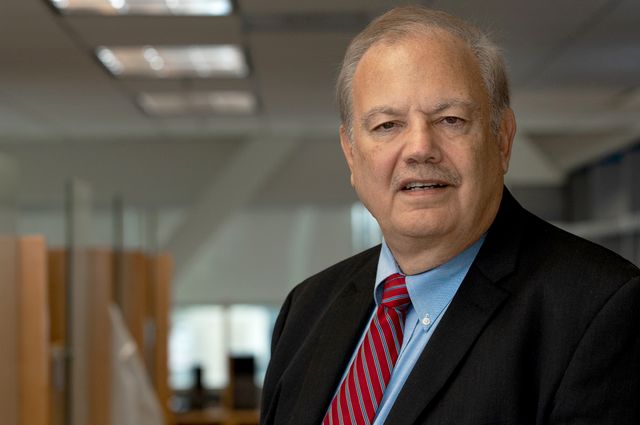Article written by Denise Heady for UCLA | February 5, 2019
“Scientist whose work led to development of Herceptin honored for innovations in molecularly targeted treatments
Dr. Dennis Slamon, director of the Revlon/UCLA Women’s Cancer Research Program, has been named a co-winner of the 2019 Sjöberg Prize by the Royal Swedish Academy of Sciences and Sweden’s Sjöberg Foundation. Honored for his groundbreaking research that led to the development of successful targeted cancer therapies, Slamon shares the award with Dr. Brian Druker of Oregon Health & Science University.
The Sjöberg Prize has been awarded annually since 2016 to recognize outstanding cancer research. The honor carries a prize of $1 million — $100,000 as award money and $900,000 to fund future research — which Slamon and Druker will split equally. Among the previous honorees is Dr. James Allison of the University of Texas MD Anderson Cancer Center, who went on to win the Nobel Prize in physiology or medicine for 2018.
Slamon, who also is director of clinical and translational research at the UCLA Jonsson Comprehensive Cancer Center, was selected for his ‘groundbreaking contributions to the clinical development of targeted therapy directed against genetic aberrations in cancer,’ according to the Royal Swedish Academy. He will present a lecture at the Karolinska Institute in Stockholm on March 29 and receive the award from Carl XVI Gustaf the king of Sweden, in a March 31 ceremony in that city.
Slamon’s research led to the development of the breast cancer drug trastuzumab (Herceptin), which since its introduction in 1998, has saved thousands of women’s lives by targeting a specific genetic alteration. The advance also helped pave the way for other targeted cancer therapies that have followed in the years since.
‘I am deeply honored and humbled to be acknowledged by the Royal Swedish Academy of Sciences,’ said Slamon, who is also a professor of medicine, chief of hematology/oncology and executive vice chair for research at the David Geffen School of Medicine at UCLA. ‘I’m very gratified that this targeted therapy has been able to help so many breast cancer patients, but the real heroes of the Herceptin development story are the many women who participated in the clinical trials of this drug when no one knew whether or not it would work.’
Video: Royal Swedish Academy of Sciences award announcement
The development of Herceptin, which is marketed by Genentech, has been cited as the first triumph in an emerging wave of new, more effective therapies designed to fight cancer at its genetic roots. In the early 1980s, Slamon identified a new, more aggressive subtype of breast cancer called HER2-positive (HER2+); in 1987, he discovered the link between the HER2+ gene alteration and aggressive breast cancer. He then proved the theory that if researchers could identify what was altered in a cancer cell compared to normal cells, they could attempt to target and treat it — something many cancer researchers doubted would be effective.
‘Dr. Slamon is an extraordinary physician and scientist who has made tremendous contributions to our understanding of cancer,’ said Dr. Kelsey Martin, dean of the Geffen School of Medicine. ‘His research helped establish the foundation for therapies that target the specific genetic mutations driving the disease.’
About 20 percent of women diagnosed with breast cancer have HER2+; roughly 200,000 to 250,000 women are diagnosed each year worldwide with that subtype. Before Slamon’s discovery, prognoses and survival rates for women with the subtype were significantly worse than for other breast cancers.
Herceptin turned that around; today, women with HER2+ breast cancer now have among the best prognoses compared with all women with breast cancer, and Slamon’s research has shown that Herceptin increases the amount of time that patients live after their diagnoses by more than 50 percent. It is estimated that 3 million women around the world have received the drug, and Slamon’s paradigm-shifting approach to cancer treatment opened up an entirely new area of research. In turn, targeted therapies for cancer, including Erbitux, Sprycel, Nerlynx and Avastin, have emerged, thanks to research by other scientists.
Slamon continues to lead the development of groundbreaking new treatments for cancer. His group led the laboratory and clinical research that resulted in the approval of palbociclib (Ibrance) for hormone receptor positive (ER+) breast cancers, the most common subtype of the disease. Palbociclib inhibits a critical enzyme called cdk-4/6 that is involved in regulating cell division. Use of palbociclib and others drugs in its class has doubled the number of women with the disease who live without any recurrence of the cancer – the largest improvement since the introduction of hormone therapy for breast cancer in the early 1970s.
‘Dr. Slamon is most deserving of this recognition,’ said Dr. Michael Teitell, director of the Jonsson Cancer Center. ‘I can’t overstate how his scientific achievements go beyond their impact on breast cancer. His work continues to benefit cancer patients and their families worldwide.’
Slamon has previously received dozens of national and international awards, including the Medal of Honor for Clinical Research, the American Cancer Society’s highest honor; the Gairdner Foundation International Award; the Salk Award for Translational Research and the National Library of Medicine Distinguished Medical Service Award.
He is a member of the American Association for the Advancement of Science, the American Society for Clinical Investigation, the American Association for Cancer Research and the American Society of Clinical Oncology. He also is a scientific consultant to the National Institutes of Health and to the U.S. Army Medical Research and Materiel Command’s Breast Cancer Research Program, and he was appointed in 2000 by President Bill Clinton to a three-year term on the President’s Cancer Panel.
The story of Slamon’s efforts to bring Herceptin to breast cancer patients was detailed in Robert Bazell’s 1998 book ‘HER-2: The Making of Herceptin, a Revolutionary Treatment for Breast Cancer.’ That book was adapted into the 2008 television movie “Living Proof,” which starred Harry Connick Jr. as Slamon.”
Read the full article here.

